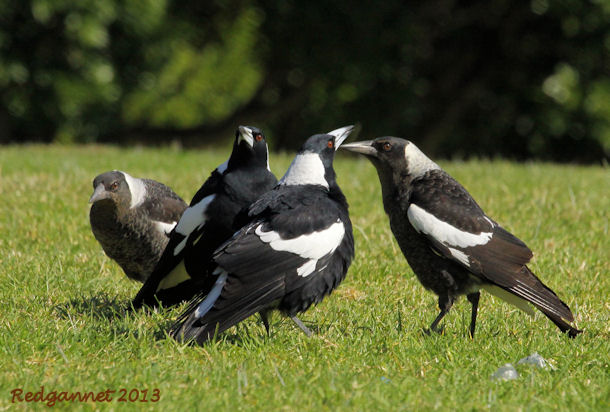I don’t know
how I previously missed this little short cut from Powell’s Creek Park into
Sydney’s Bi-Centennial Park. A small bridge leads from the northernmost tip of
Powell Creek Park, crossing the creek’s western fork into Bressingham Park. A
grassy plateau looks down onto playing fields to the southwest and the creek to
the east.
There were plenty of Grey Teal and Chestnut Teal on the lagoon. I sometimes struggle to separate Grey Teal and Chestnut Teal, but today they appeared obviously different. Perhaps this was a non-breeding male, but it stood out distinctly from the light-faced greys.
Australian Pelican, Black Swan and Australian Grebe were also present in smaller numbers. With a field guide, I might have tried to make a Hoary-headed Grebe, but in their winter gear, I wasn’t confident.
From the hide at the northern end (Google Earth ref; 33 50 8.87S 151 4 43.77E) I could look out over the lagoon and count the Pied Stilt, Black-fronted Dotterel and Superb Fairywrens.
A Black-shouldered Kite watched over the rough grass, on the lookout for any small thing that moved. A path
passes beneath the motorway and into Bi-centennial Park at Google Earth ref; 33
51 2.46S 151 4 52.46E. From here, it may be as well to explore the freshwater Lake
Belvedere to the west, but I didn’t quite have my bearings and continued north
towards the mangroves.
A small
flock of Galahs fed on grass stalks,
but it is probably too late now for the 10,000 Birds Pink Weekend. Noisy Miners called from the tops of
mangroves by the path, upset by a pair of Australian
Ravens that had just passed over.
I was
heading north, towards the lagoon, but had to pick up the pace through the
mangroves as a large group of school children were gathering and I wanted to
stay ahead of them.
I was slowed
by a Willie Wagtail, Yellow Thornbills and a Spotted Pardalote.
There were plenty of Grey Teal and Chestnut Teal on the lagoon. I sometimes struggle to separate Grey Teal and Chestnut Teal, but today they appeared obviously different. Perhaps this was a non-breeding male, but it stood out distinctly from the light-faced greys.
Australian Pelican, Black Swan and Australian Grebe were also present in smaller numbers. With a field guide, I might have tried to make a Hoary-headed Grebe, but in their winter gear, I wasn’t confident.
From the hide at the northern end (Google Earth ref; 33 50 8.87S 151 4 43.77E) I could look out over the lagoon and count the Pied Stilt, Black-fronted Dotterel and Superb Fairywrens.
Homebush Bay
was used in the past as a wrecking site for old boats. The rotting hulks are
still there and usually provide a good roosting spot for cormorants and gulls,
but there were only very few today.
From here, I
retraced my steps along the path that runs bedside the lagoon and cut right
onto the Badu Mangrove boardwalk. The boardwalk has never been terribly
productive for birds, but the freshwater ponds that lie at the far end are
usually interesting (Google Earth ref; 33 50 40.32S 151 4 35.95). Royal
Spoonbills can often be found here and sure enough, one flew in to join another
that was preening on a small island.
At the southern end of the freshwater pond path open lawns lead up and over a small rise. The lawns are usually a reliable place to find Masked Lapwings. Thence to Lake
Belvedere, where cormorants and Australian Darters were still tending young in
their nests. Four species of cormorant were seen here with Welcome Swallows,
Dusky Moorhen and Pacific Black Duck. In the trees by the car park a flock of
Little Corella made my third cockatoo species of the day.
Birds seen;
46
Black Swan
3, Pacific Black Duck 2, Grey Teal 120, Chestnut Teal 50, White-eyed Duck 1, Australian
Grebe 5, Hoary-headed Grebe 2, Little Black Cormorant 5, Great Cormorant 6,
Pied Cormorant 40, Little Pied Cormorant 8, Australian Darter 6, Australian
Pelican 6, Great Egret 2, White-faced Heron 7, Little Egret 2, Australian Ibis
1, Royal Spoonbill 2, Australian Kite 1, Brown Goshawk 1, Purple Swamphen 15Dusky
Moorhen 35, Eurasian Coot 350, Red-kneed Dotterel 1, Black-fronted Dotterel 8,
Pied Stilt 120, Silver Gull 30, Spotted Dove 10, Galah 7, Little Corella 35, Rainbow
Lorikeet 15, Superb Fairywren 35, White-plumed Honeyeater 2, Noisy Miner 8, Red
Wattlebird 1, Spotted Pardalote 2, Yellow Thornbill 20, Australian Magpie 6,
Pied Currawong 2, Black-faced Cuckoo-shrike 3, Australian Figbird 1, Willie-
Wagtail 2, Grey Fantail 2, Magpie-lark 3, Australian Raven 2, Welcome Swallow
15, Silver-eye 20.
For Bi-Centennial
Park, take the Northern (red) Line towards Epping and get off at Concorde West
(Google Earth ref; 33 50 52.69S 151 5 7.10E). Exit to the west and follow
Victoria Ave for 250m. Pass under the motorway and “Voila!”
For previous posts from Bi-Centennial Park, follow the links below;
http://redgannet.blogspot.com/2009/05/plover-or-dotterel.html
http://redgannet.blogspot.co.uk/2012/02/bi-centennial-park-sydney-australia.html
http://redgannet.blogspot.co.uk/2012/06/bi-centennial-park-sydney-june-2012.html
Visit the dedicated Australia Page for more posts from Sydney including North Heads and the Sydney Botanic Gardens.
For previous posts from Bi-Centennial Park, follow the links below;
http://redgannet.blogspot.com/2009/05/plover-or-dotterel.html
http://redgannet.blogspot.co.uk/2012/02/bi-centennial-park-sydney-australia.html
http://redgannet.blogspot.co.uk/2012/06/bi-centennial-park-sydney-june-2012.html
Visit the dedicated Australia Page for more posts from Sydney including North Heads and the Sydney Botanic Gardens.












No comments:
Post a Comment